Murdoch University SUS512 Learning Journal: Weeks 1-4, Analysis
VerifiedAdded on 2022/08/26
|8
|2372
|10
Homework Assignment
AI Summary
This learning journal, created by a student, documents reflections on the "Sustainability, Ecology and Communities" course (SUS512) over four weeks. The journal entries analyze assigned readings, define key concepts like sustainability, systems thinking, and socio-ecological systems, and provide evidence from credible sources. The student explores connections between the readings and real-world situations, particularly in Australia, and discusses potential project ideas related to plastic waste management and marine wildlife conservation. The assignment demonstrates the student's understanding of sustainability principles, systems thinking, and their ability to apply these concepts to contemporary environmental challenges. The journal also highlights the student's engagement in tutorial discussions and newly acquired knowledge.
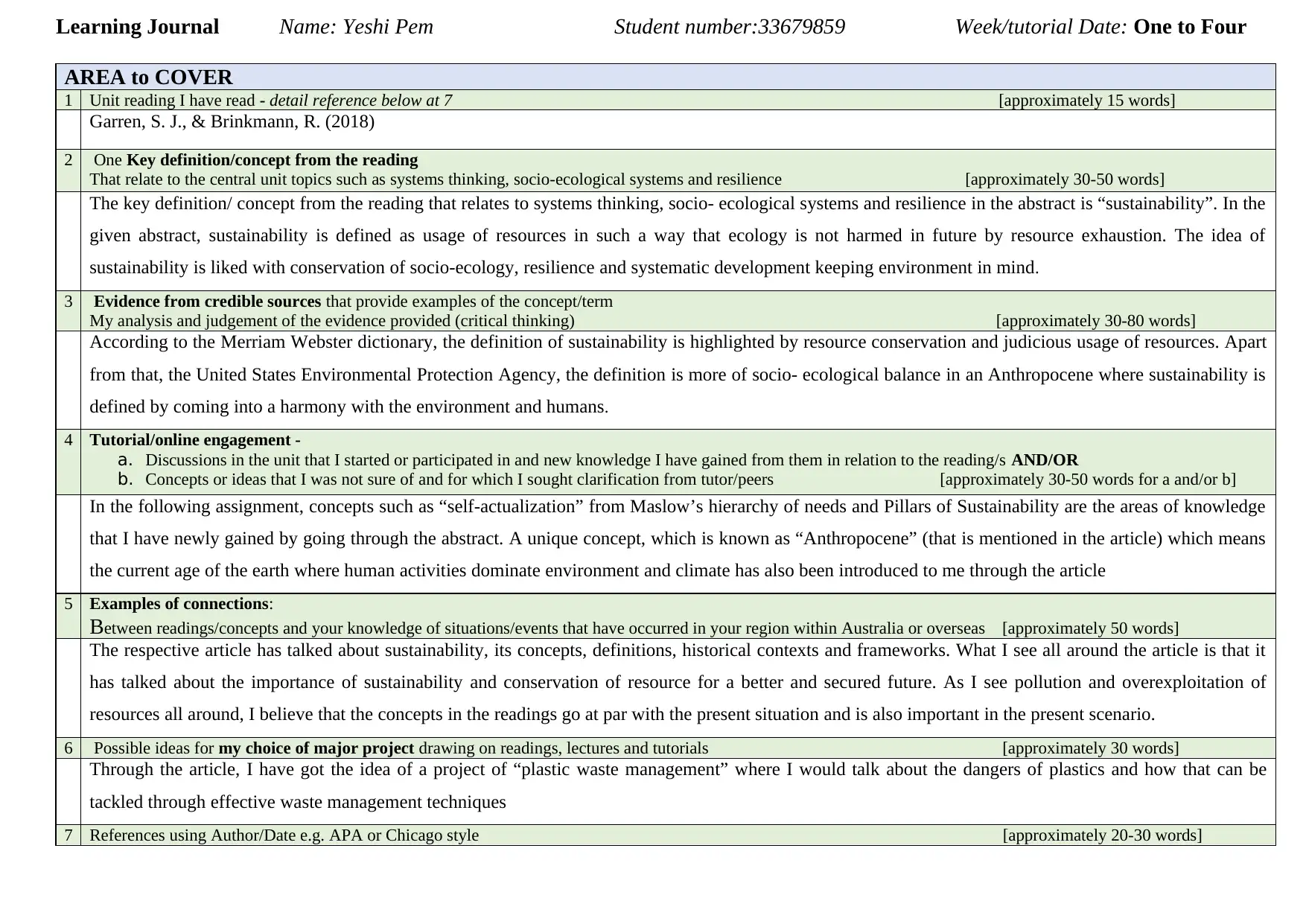
Learning Journal Name: Yeshi Pem Student number:33679859 Week/tutorial Date: One to Four
AREA to COVER
1 Unit reading I have read - detail reference below at 7 [approximately 15 words]
Garren, S. J., & Brinkmann, R. (2018)
2 One Key definition/concept from the reading
That relate to the central unit topics such as systems thinking, socio-ecological systems and resilience [approximately 30-50 words]
The key definition/ concept from the reading that relates to systems thinking, socio- ecological systems and resilience in the abstract is “sustainability”. In the
given abstract, sustainability is defined as usage of resources in such a way that ecology is not harmed in future by resource exhaustion. The idea of
sustainability is liked with conservation of socio-ecology, resilience and systematic development keeping environment in mind.
3 Evidence from credible sources that provide examples of the concept/term
My analysis and judgement of the evidence provided (critical thinking) [approximately 30-80 words]
According to the Merriam Webster dictionary, the definition of sustainability is highlighted by resource conservation and judicious usage of resources. Apart
from that, the United States Environmental Protection Agency, the definition is more of socio- ecological balance in an Anthropocene where sustainability is
defined by coming into a harmony with the environment and humans.
4 Tutorial/online engagement -
a. Discussions in the unit that I started or participated in and new knowledge I have gained from them in relation to the reading/s AND/OR
b. Concepts or ideas that I was not sure of and for which I sought clarification from tutor/peers [approximately 30-50 words for a and/or b]
In the following assignment, concepts such as “self-actualization” from Maslow’s hierarchy of needs and Pillars of Sustainability are the areas of knowledge
that I have newly gained by going through the abstract. A unique concept, which is known as “Anthropocene” (that is mentioned in the article) which means
the current age of the earth where human activities dominate environment and climate has also been introduced to me through the article
5 Examples of connections:
Between readings/concepts and your knowledge of situations/events that have occurred in your region within Australia or overseas [approximately 50 words]
The respective article has talked about sustainability, its concepts, definitions, historical contexts and frameworks. What I see all around the article is that it
has talked about the importance of sustainability and conservation of resource for a better and secured future. As I see pollution and overexploitation of
resources all around, I believe that the concepts in the readings go at par with the present situation and is also important in the present scenario.
6 Possible ideas for my choice of major project drawing on readings, lectures and tutorials [approximately 30 words]
Through the article, I have got the idea of a project of “plastic waste management” where I would talk about the dangers of plastics and how that can be
tackled through effective waste management techniques
7 References using Author/Date e.g. APA or Chicago style [approximately 20-30 words]
AREA to COVER
1 Unit reading I have read - detail reference below at 7 [approximately 15 words]
Garren, S. J., & Brinkmann, R. (2018)
2 One Key definition/concept from the reading
That relate to the central unit topics such as systems thinking, socio-ecological systems and resilience [approximately 30-50 words]
The key definition/ concept from the reading that relates to systems thinking, socio- ecological systems and resilience in the abstract is “sustainability”. In the
given abstract, sustainability is defined as usage of resources in such a way that ecology is not harmed in future by resource exhaustion. The idea of
sustainability is liked with conservation of socio-ecology, resilience and systematic development keeping environment in mind.
3 Evidence from credible sources that provide examples of the concept/term
My analysis and judgement of the evidence provided (critical thinking) [approximately 30-80 words]
According to the Merriam Webster dictionary, the definition of sustainability is highlighted by resource conservation and judicious usage of resources. Apart
from that, the United States Environmental Protection Agency, the definition is more of socio- ecological balance in an Anthropocene where sustainability is
defined by coming into a harmony with the environment and humans.
4 Tutorial/online engagement -
a. Discussions in the unit that I started or participated in and new knowledge I have gained from them in relation to the reading/s AND/OR
b. Concepts or ideas that I was not sure of and for which I sought clarification from tutor/peers [approximately 30-50 words for a and/or b]
In the following assignment, concepts such as “self-actualization” from Maslow’s hierarchy of needs and Pillars of Sustainability are the areas of knowledge
that I have newly gained by going through the abstract. A unique concept, which is known as “Anthropocene” (that is mentioned in the article) which means
the current age of the earth where human activities dominate environment and climate has also been introduced to me through the article
5 Examples of connections:
Between readings/concepts and your knowledge of situations/events that have occurred in your region within Australia or overseas [approximately 50 words]
The respective article has talked about sustainability, its concepts, definitions, historical contexts and frameworks. What I see all around the article is that it
has talked about the importance of sustainability and conservation of resource for a better and secured future. As I see pollution and overexploitation of
resources all around, I believe that the concepts in the readings go at par with the present situation and is also important in the present scenario.
6 Possible ideas for my choice of major project drawing on readings, lectures and tutorials [approximately 30 words]
Through the article, I have got the idea of a project of “plastic waste management” where I would talk about the dangers of plastics and how that can be
tackled through effective waste management techniques
7 References using Author/Date e.g. APA or Chicago style [approximately 20-30 words]
Paraphrase This Document
Need a fresh take? Get an instant paraphrase of this document with our AI Paraphraser
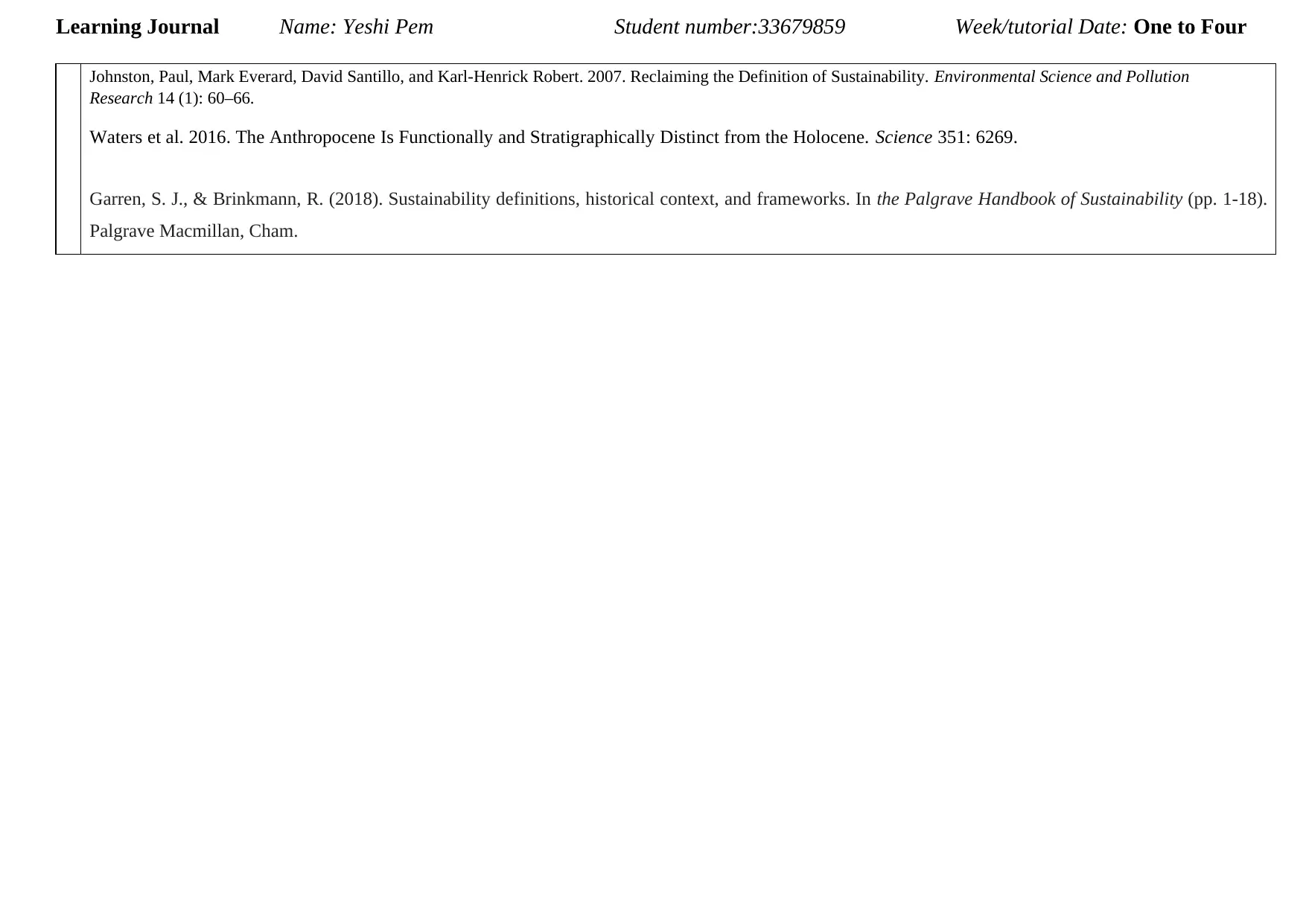
Learning Journal Name: Yeshi Pem Student number:33679859 Week/tutorial Date: One to Four
Johnston, Paul, Mark Everard, David Santillo, and Karl-Henrick Robert. 2007. Reclaiming the Definition of Sustainability. Environmental Science and Pollution
Research 14 (1): 60–66.
Waters et al. 2016. The Anthropocene Is Functionally and Stratigraphically Distinct from the Holocene. Science 351: 6269.
Garren, S. J., & Brinkmann, R. (2018). Sustainability definitions, historical context, and frameworks. In the Palgrave Handbook of Sustainability (pp. 1-18).
Palgrave Macmillan, Cham.
Johnston, Paul, Mark Everard, David Santillo, and Karl-Henrick Robert. 2007. Reclaiming the Definition of Sustainability. Environmental Science and Pollution
Research 14 (1): 60–66.
Waters et al. 2016. The Anthropocene Is Functionally and Stratigraphically Distinct from the Holocene. Science 351: 6269.
Garren, S. J., & Brinkmann, R. (2018). Sustainability definitions, historical context, and frameworks. In the Palgrave Handbook of Sustainability (pp. 1-18).
Palgrave Macmillan, Cham.
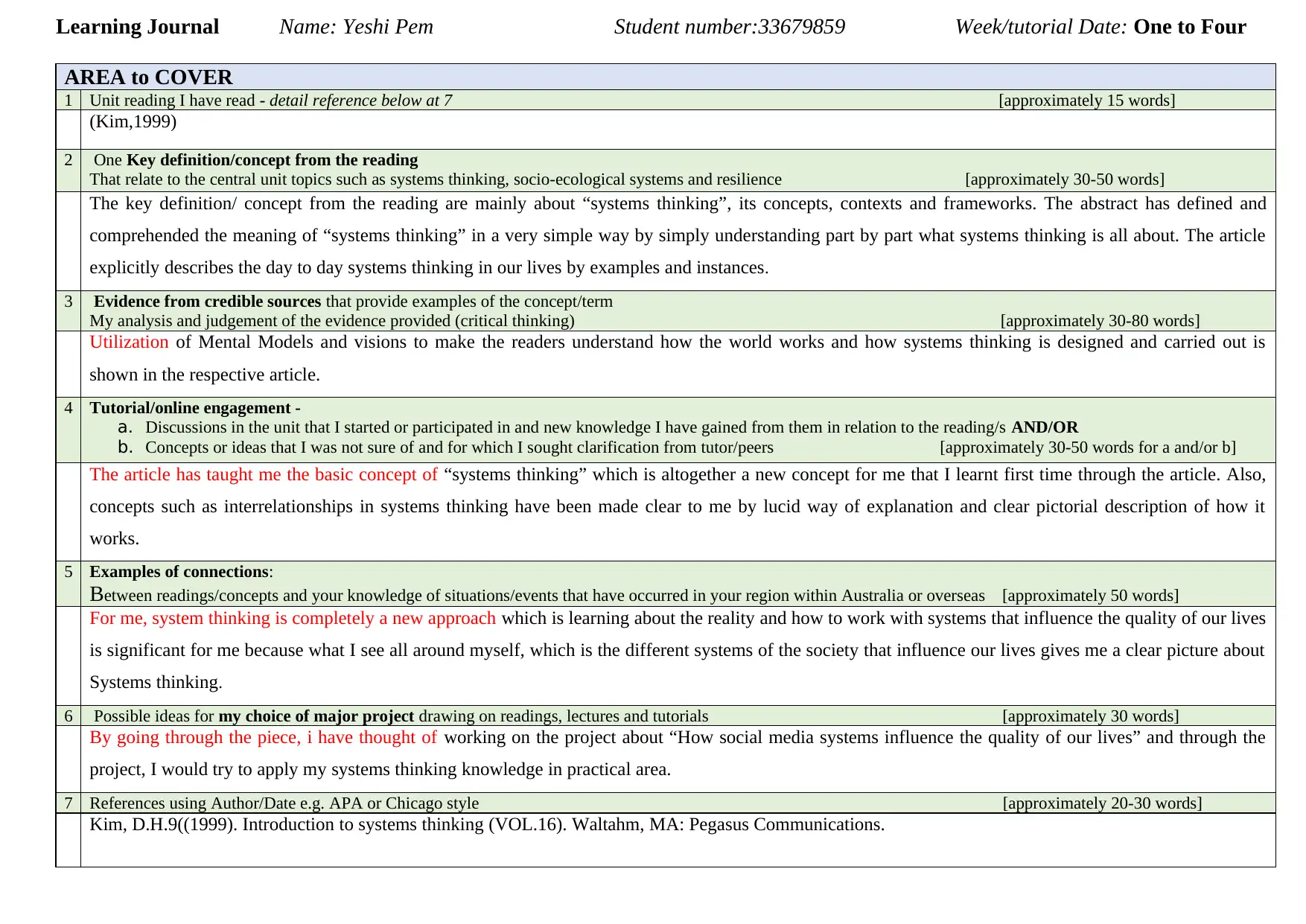
Learning Journal Name: Yeshi Pem Student number:33679859 Week/tutorial Date: One to Four
AREA to COVER
1 Unit reading I have read - detail reference below at 7 [approximately 15 words]
(Kim,1999)
2 One Key definition/concept from the reading
That relate to the central unit topics such as systems thinking, socio-ecological systems and resilience [approximately 30-50 words]
The key definition/ concept from the reading are mainly about “systems thinking”, its concepts, contexts and frameworks. The abstract has defined and
comprehended the meaning of “systems thinking” in a very simple way by simply understanding part by part what systems thinking is all about. The article
explicitly describes the day to day systems thinking in our lives by examples and instances.
3 Evidence from credible sources that provide examples of the concept/term
My analysis and judgement of the evidence provided (critical thinking) [approximately 30-80 words]
Utilization of Mental Models and visions to make the readers understand how the world works and how systems thinking is designed and carried out is
shown in the respective article.
4 Tutorial/online engagement -
a. Discussions in the unit that I started or participated in and new knowledge I have gained from them in relation to the reading/s AND/OR
b. Concepts or ideas that I was not sure of and for which I sought clarification from tutor/peers [approximately 30-50 words for a and/or b]
The article has taught me the basic concept of “systems thinking” which is altogether a new concept for me that I learnt first time through the article. Also,
concepts such as interrelationships in systems thinking have been made clear to me by lucid way of explanation and clear pictorial description of how it
works.
5 Examples of connections:
Between readings/concepts and your knowledge of situations/events that have occurred in your region within Australia or overseas [approximately 50 words]
For me, system thinking is completely a new approach which is learning about the reality and how to work with systems that influence the quality of our lives
is significant for me because what I see all around myself, which is the different systems of the society that influence our lives gives me a clear picture about
Systems thinking.
6 Possible ideas for my choice of major project drawing on readings, lectures and tutorials [approximately 30 words]
By going through the piece, i have thought of working on the project about “How social media systems influence the quality of our lives” and through the
project, I would try to apply my systems thinking knowledge in practical area.
7 References using Author/Date e.g. APA or Chicago style [approximately 20-30 words]
Kim, D.H.9((1999). Introduction to systems thinking (VOL.16). Waltahm, MA: Pegasus Communications.
AREA to COVER
1 Unit reading I have read - detail reference below at 7 [approximately 15 words]
(Kim,1999)
2 One Key definition/concept from the reading
That relate to the central unit topics such as systems thinking, socio-ecological systems and resilience [approximately 30-50 words]
The key definition/ concept from the reading are mainly about “systems thinking”, its concepts, contexts and frameworks. The abstract has defined and
comprehended the meaning of “systems thinking” in a very simple way by simply understanding part by part what systems thinking is all about. The article
explicitly describes the day to day systems thinking in our lives by examples and instances.
3 Evidence from credible sources that provide examples of the concept/term
My analysis and judgement of the evidence provided (critical thinking) [approximately 30-80 words]
Utilization of Mental Models and visions to make the readers understand how the world works and how systems thinking is designed and carried out is
shown in the respective article.
4 Tutorial/online engagement -
a. Discussions in the unit that I started or participated in and new knowledge I have gained from them in relation to the reading/s AND/OR
b. Concepts or ideas that I was not sure of and for which I sought clarification from tutor/peers [approximately 30-50 words for a and/or b]
The article has taught me the basic concept of “systems thinking” which is altogether a new concept for me that I learnt first time through the article. Also,
concepts such as interrelationships in systems thinking have been made clear to me by lucid way of explanation and clear pictorial description of how it
works.
5 Examples of connections:
Between readings/concepts and your knowledge of situations/events that have occurred in your region within Australia or overseas [approximately 50 words]
For me, system thinking is completely a new approach which is learning about the reality and how to work with systems that influence the quality of our lives
is significant for me because what I see all around myself, which is the different systems of the society that influence our lives gives me a clear picture about
Systems thinking.
6 Possible ideas for my choice of major project drawing on readings, lectures and tutorials [approximately 30 words]
By going through the piece, i have thought of working on the project about “How social media systems influence the quality of our lives” and through the
project, I would try to apply my systems thinking knowledge in practical area.
7 References using Author/Date e.g. APA or Chicago style [approximately 20-30 words]
Kim, D.H.9((1999). Introduction to systems thinking (VOL.16). Waltahm, MA: Pegasus Communications.
⊘ This is a preview!⊘
Do you want full access?
Subscribe today to unlock all pages.

Trusted by 1+ million students worldwide
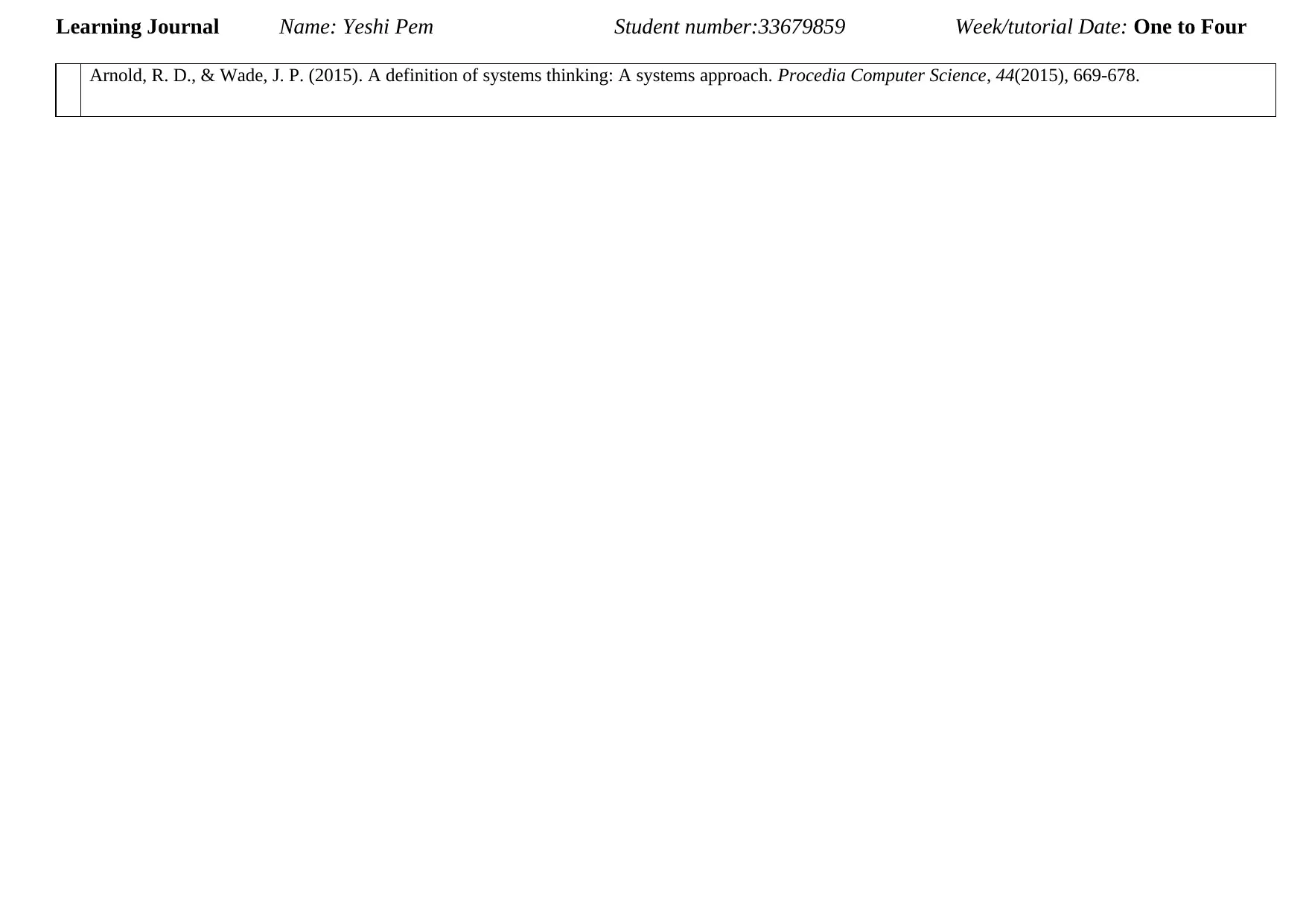
Learning Journal Name: Yeshi Pem Student number:33679859 Week/tutorial Date: One to Four
Arnold, R. D., & Wade, J. P. (2015). A definition of systems thinking: A systems approach. Procedia Computer Science, 44(2015), 669-678.
Arnold, R. D., & Wade, J. P. (2015). A definition of systems thinking: A systems approach. Procedia Computer Science, 44(2015), 669-678.
Paraphrase This Document
Need a fresh take? Get an instant paraphrase of this document with our AI Paraphraser
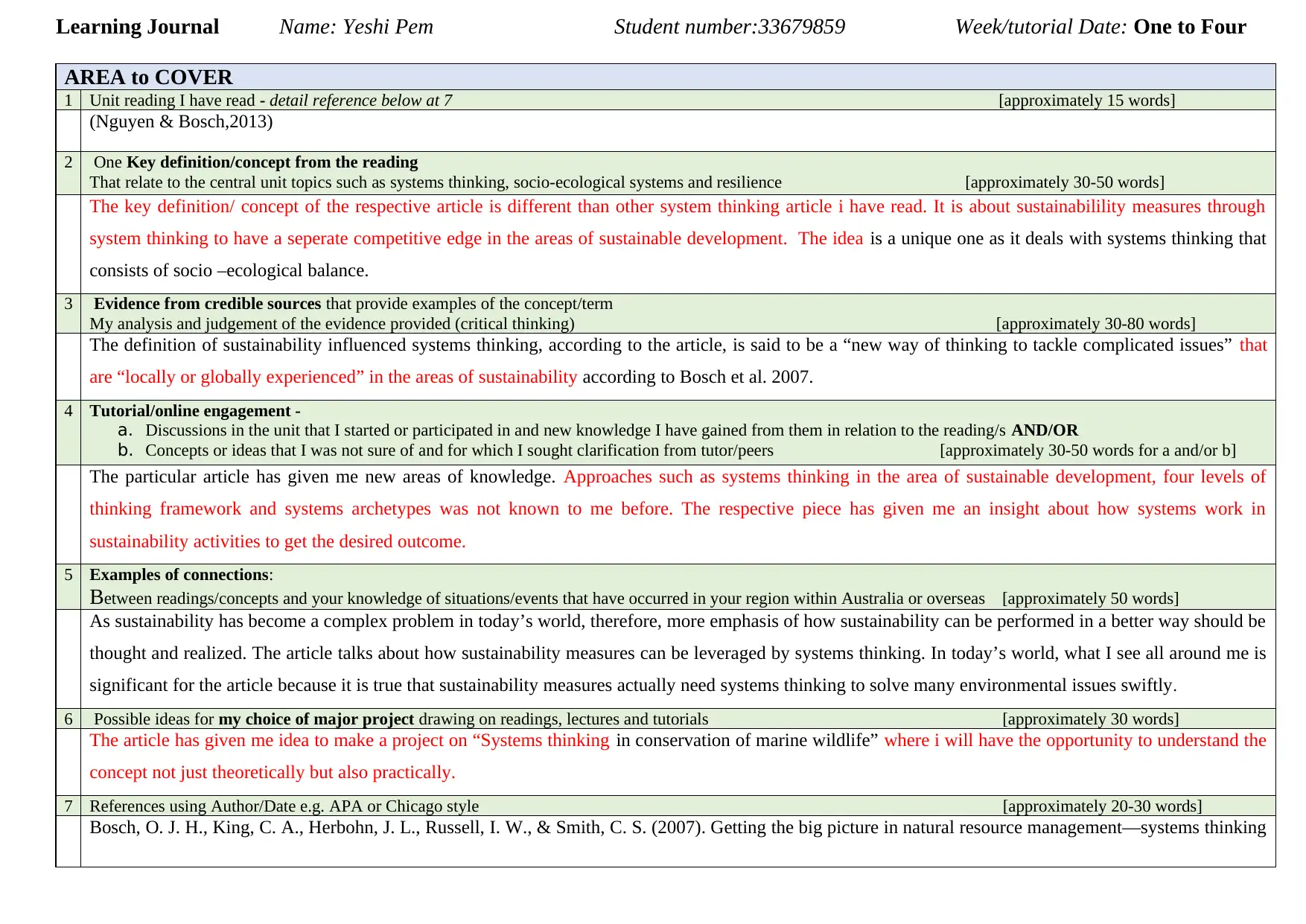
Learning Journal Name: Yeshi Pem Student number:33679859 Week/tutorial Date: One to Four
AREA to COVER
1 Unit reading I have read - detail reference below at 7 [approximately 15 words]
(Nguyen & Bosch,2013)
2 One Key definition/concept from the reading
That relate to the central unit topics such as systems thinking, socio-ecological systems and resilience [approximately 30-50 words]
The key definition/ concept of the respective article is different than other system thinking article i have read. It is about sustainabilility measures through
system thinking to have a seperate competitive edge in the areas of sustainable development. The idea is a unique one as it deals with systems thinking that
consists of socio –ecological balance.
3 Evidence from credible sources that provide examples of the concept/term
My analysis and judgement of the evidence provided (critical thinking) [approximately 30-80 words]
The definition of sustainability influenced systems thinking, according to the article, is said to be a “new way of thinking to tackle complicated issues” that
are “locally or globally experienced” in the areas of sustainability according to Bosch et al. 2007.
4 Tutorial/online engagement -
a. Discussions in the unit that I started or participated in and new knowledge I have gained from them in relation to the reading/s AND/OR
b. Concepts or ideas that I was not sure of and for which I sought clarification from tutor/peers [approximately 30-50 words for a and/or b]
The particular article has given me new areas of knowledge. Approaches such as systems thinking in the area of sustainable development, four levels of
thinking framework and systems archetypes was not known to me before. The respective piece has given me an insight about how systems work in
sustainability activities to get the desired outcome.
5 Examples of connections:
Between readings/concepts and your knowledge of situations/events that have occurred in your region within Australia or overseas [approximately 50 words]
As sustainability has become a complex problem in today’s world, therefore, more emphasis of how sustainability can be performed in a better way should be
thought and realized. The article talks about how sustainability measures can be leveraged by systems thinking. In today’s world, what I see all around me is
significant for the article because it is true that sustainability measures actually need systems thinking to solve many environmental issues swiftly.
6 Possible ideas for my choice of major project drawing on readings, lectures and tutorials [approximately 30 words]
The article has given me idea to make a project on “Systems thinking in conservation of marine wildlife” where i will have the opportunity to understand the
concept not just theoretically but also practically.
7 References using Author/Date e.g. APA or Chicago style [approximately 20-30 words]
Bosch, O. J. H., King, C. A., Herbohn, J. L., Russell, I. W., & Smith, C. S. (2007). Getting the big picture in natural resource management—systems thinking
AREA to COVER
1 Unit reading I have read - detail reference below at 7 [approximately 15 words]
(Nguyen & Bosch,2013)
2 One Key definition/concept from the reading
That relate to the central unit topics such as systems thinking, socio-ecological systems and resilience [approximately 30-50 words]
The key definition/ concept of the respective article is different than other system thinking article i have read. It is about sustainabilility measures through
system thinking to have a seperate competitive edge in the areas of sustainable development. The idea is a unique one as it deals with systems thinking that
consists of socio –ecological balance.
3 Evidence from credible sources that provide examples of the concept/term
My analysis and judgement of the evidence provided (critical thinking) [approximately 30-80 words]
The definition of sustainability influenced systems thinking, according to the article, is said to be a “new way of thinking to tackle complicated issues” that
are “locally or globally experienced” in the areas of sustainability according to Bosch et al. 2007.
4 Tutorial/online engagement -
a. Discussions in the unit that I started or participated in and new knowledge I have gained from them in relation to the reading/s AND/OR
b. Concepts or ideas that I was not sure of and for which I sought clarification from tutor/peers [approximately 30-50 words for a and/or b]
The particular article has given me new areas of knowledge. Approaches such as systems thinking in the area of sustainable development, four levels of
thinking framework and systems archetypes was not known to me before. The respective piece has given me an insight about how systems work in
sustainability activities to get the desired outcome.
5 Examples of connections:
Between readings/concepts and your knowledge of situations/events that have occurred in your region within Australia or overseas [approximately 50 words]
As sustainability has become a complex problem in today’s world, therefore, more emphasis of how sustainability can be performed in a better way should be
thought and realized. The article talks about how sustainability measures can be leveraged by systems thinking. In today’s world, what I see all around me is
significant for the article because it is true that sustainability measures actually need systems thinking to solve many environmental issues swiftly.
6 Possible ideas for my choice of major project drawing on readings, lectures and tutorials [approximately 30 words]
The article has given me idea to make a project on “Systems thinking in conservation of marine wildlife” where i will have the opportunity to understand the
concept not just theoretically but also practically.
7 References using Author/Date e.g. APA or Chicago style [approximately 20-30 words]
Bosch, O. J. H., King, C. A., Herbohn, J. L., Russell, I. W., & Smith, C. S. (2007). Getting the big picture in natural resource management—systems thinking
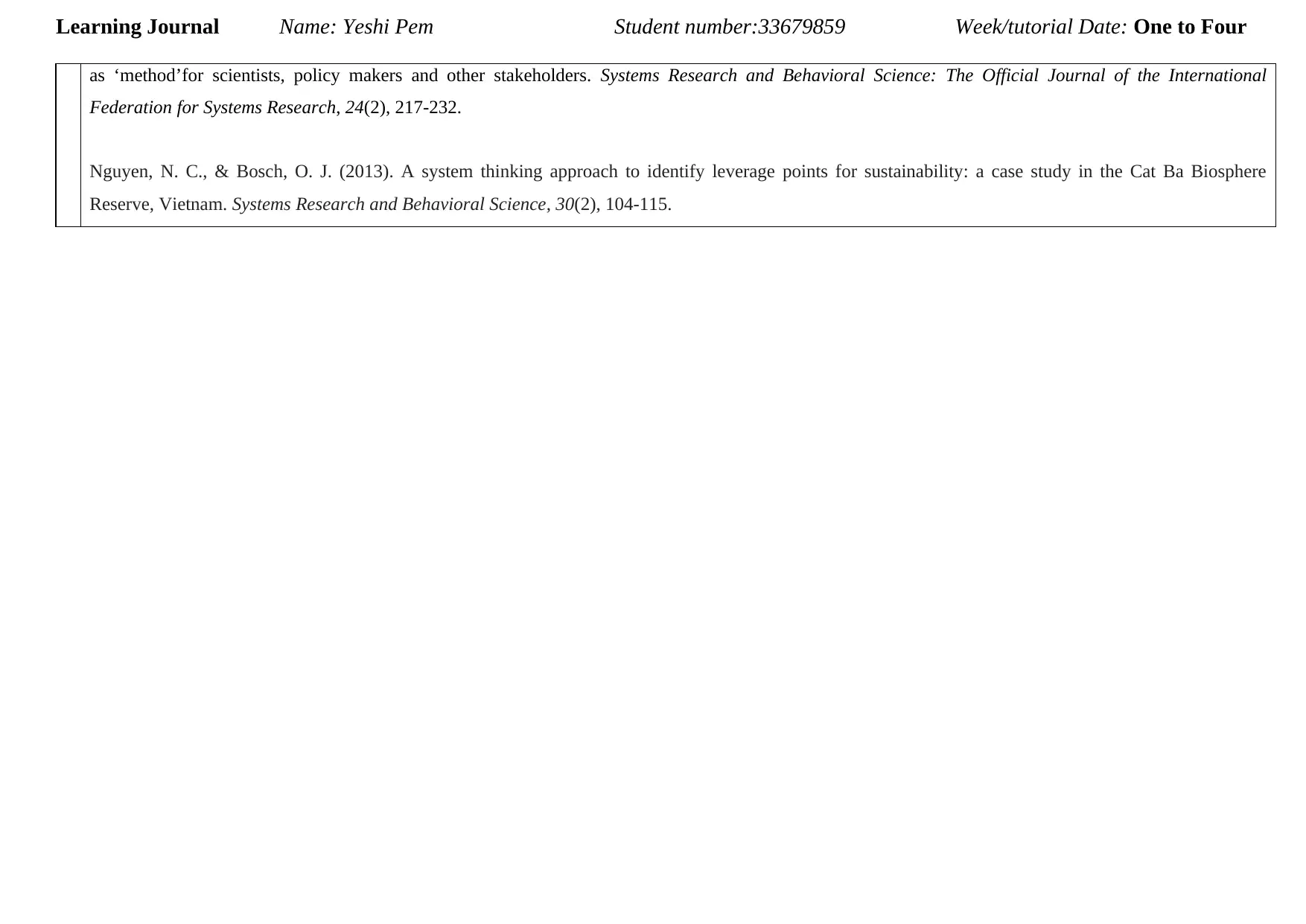
Learning Journal Name: Yeshi Pem Student number:33679859 Week/tutorial Date: One to Four
as ‘method’for scientists, policy makers and other stakeholders. Systems Research and Behavioral Science: The Official Journal of the International
Federation for Systems Research, 24(2), 217-232.
Nguyen, N. C., & Bosch, O. J. (2013). A system thinking approach to identify leverage points for sustainability: a case study in the Cat Ba Biosphere
Reserve, Vietnam. Systems Research and Behavioral Science, 30(2), 104-115.
as ‘method’for scientists, policy makers and other stakeholders. Systems Research and Behavioral Science: The Official Journal of the International
Federation for Systems Research, 24(2), 217-232.
Nguyen, N. C., & Bosch, O. J. (2013). A system thinking approach to identify leverage points for sustainability: a case study in the Cat Ba Biosphere
Reserve, Vietnam. Systems Research and Behavioral Science, 30(2), 104-115.
⊘ This is a preview!⊘
Do you want full access?
Subscribe today to unlock all pages.

Trusted by 1+ million students worldwide
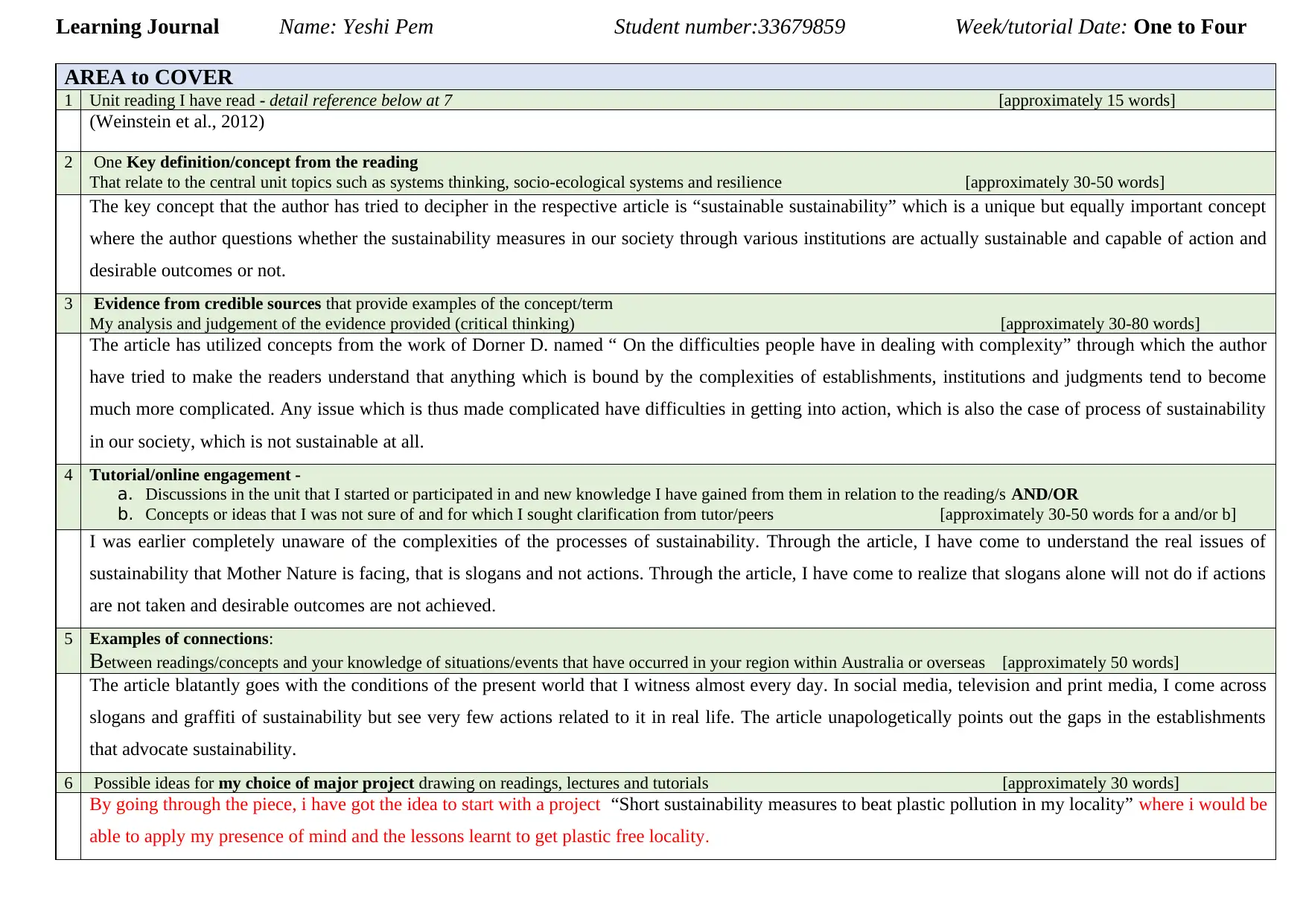
Learning Journal Name: Yeshi Pem Student number:33679859 Week/tutorial Date: One to Four
AREA to COVER
1 Unit reading I have read - detail reference below at 7 [approximately 15 words]
(Weinstein et al., 2012)
2 One Key definition/concept from the reading
That relate to the central unit topics such as systems thinking, socio-ecological systems and resilience [approximately 30-50 words]
The key concept that the author has tried to decipher in the respective article is “sustainable sustainability” which is a unique but equally important concept
where the author questions whether the sustainability measures in our society through various institutions are actually sustainable and capable of action and
desirable outcomes or not.
3 Evidence from credible sources that provide examples of the concept/term
My analysis and judgement of the evidence provided (critical thinking) [approximately 30-80 words]
The article has utilized concepts from the work of Dorner D. named “ On the difficulties people have in dealing with complexity” through which the author
have tried to make the readers understand that anything which is bound by the complexities of establishments, institutions and judgments tend to become
much more complicated. Any issue which is thus made complicated have difficulties in getting into action, which is also the case of process of sustainability
in our society, which is not sustainable at all.
4 Tutorial/online engagement -
a. Discussions in the unit that I started or participated in and new knowledge I have gained from them in relation to the reading/s AND/OR
b. Concepts or ideas that I was not sure of and for which I sought clarification from tutor/peers [approximately 30-50 words for a and/or b]
I was earlier completely unaware of the complexities of the processes of sustainability. Through the article, I have come to understand the real issues of
sustainability that Mother Nature is facing, that is slogans and not actions. Through the article, I have come to realize that slogans alone will not do if actions
are not taken and desirable outcomes are not achieved.
5 Examples of connections:
Between readings/concepts and your knowledge of situations/events that have occurred in your region within Australia or overseas [approximately 50 words]
The article blatantly goes with the conditions of the present world that I witness almost every day. In social media, television and print media, I come across
slogans and graffiti of sustainability but see very few actions related to it in real life. The article unapologetically points out the gaps in the establishments
that advocate sustainability.
6 Possible ideas for my choice of major project drawing on readings, lectures and tutorials [approximately 30 words]
By going through the piece, i have got the idea to start with a project “Short sustainability measures to beat plastic pollution in my locality” where i would be
able to apply my presence of mind and the lessons learnt to get plastic free locality.
AREA to COVER
1 Unit reading I have read - detail reference below at 7 [approximately 15 words]
(Weinstein et al., 2012)
2 One Key definition/concept from the reading
That relate to the central unit topics such as systems thinking, socio-ecological systems and resilience [approximately 30-50 words]
The key concept that the author has tried to decipher in the respective article is “sustainable sustainability” which is a unique but equally important concept
where the author questions whether the sustainability measures in our society through various institutions are actually sustainable and capable of action and
desirable outcomes or not.
3 Evidence from credible sources that provide examples of the concept/term
My analysis and judgement of the evidence provided (critical thinking) [approximately 30-80 words]
The article has utilized concepts from the work of Dorner D. named “ On the difficulties people have in dealing with complexity” through which the author
have tried to make the readers understand that anything which is bound by the complexities of establishments, institutions and judgments tend to become
much more complicated. Any issue which is thus made complicated have difficulties in getting into action, which is also the case of process of sustainability
in our society, which is not sustainable at all.
4 Tutorial/online engagement -
a. Discussions in the unit that I started or participated in and new knowledge I have gained from them in relation to the reading/s AND/OR
b. Concepts or ideas that I was not sure of and for which I sought clarification from tutor/peers [approximately 30-50 words for a and/or b]
I was earlier completely unaware of the complexities of the processes of sustainability. Through the article, I have come to understand the real issues of
sustainability that Mother Nature is facing, that is slogans and not actions. Through the article, I have come to realize that slogans alone will not do if actions
are not taken and desirable outcomes are not achieved.
5 Examples of connections:
Between readings/concepts and your knowledge of situations/events that have occurred in your region within Australia or overseas [approximately 50 words]
The article blatantly goes with the conditions of the present world that I witness almost every day. In social media, television and print media, I come across
slogans and graffiti of sustainability but see very few actions related to it in real life. The article unapologetically points out the gaps in the establishments
that advocate sustainability.
6 Possible ideas for my choice of major project drawing on readings, lectures and tutorials [approximately 30 words]
By going through the piece, i have got the idea to start with a project “Short sustainability measures to beat plastic pollution in my locality” where i would be
able to apply my presence of mind and the lessons learnt to get plastic free locality.
Paraphrase This Document
Need a fresh take? Get an instant paraphrase of this document with our AI Paraphraser
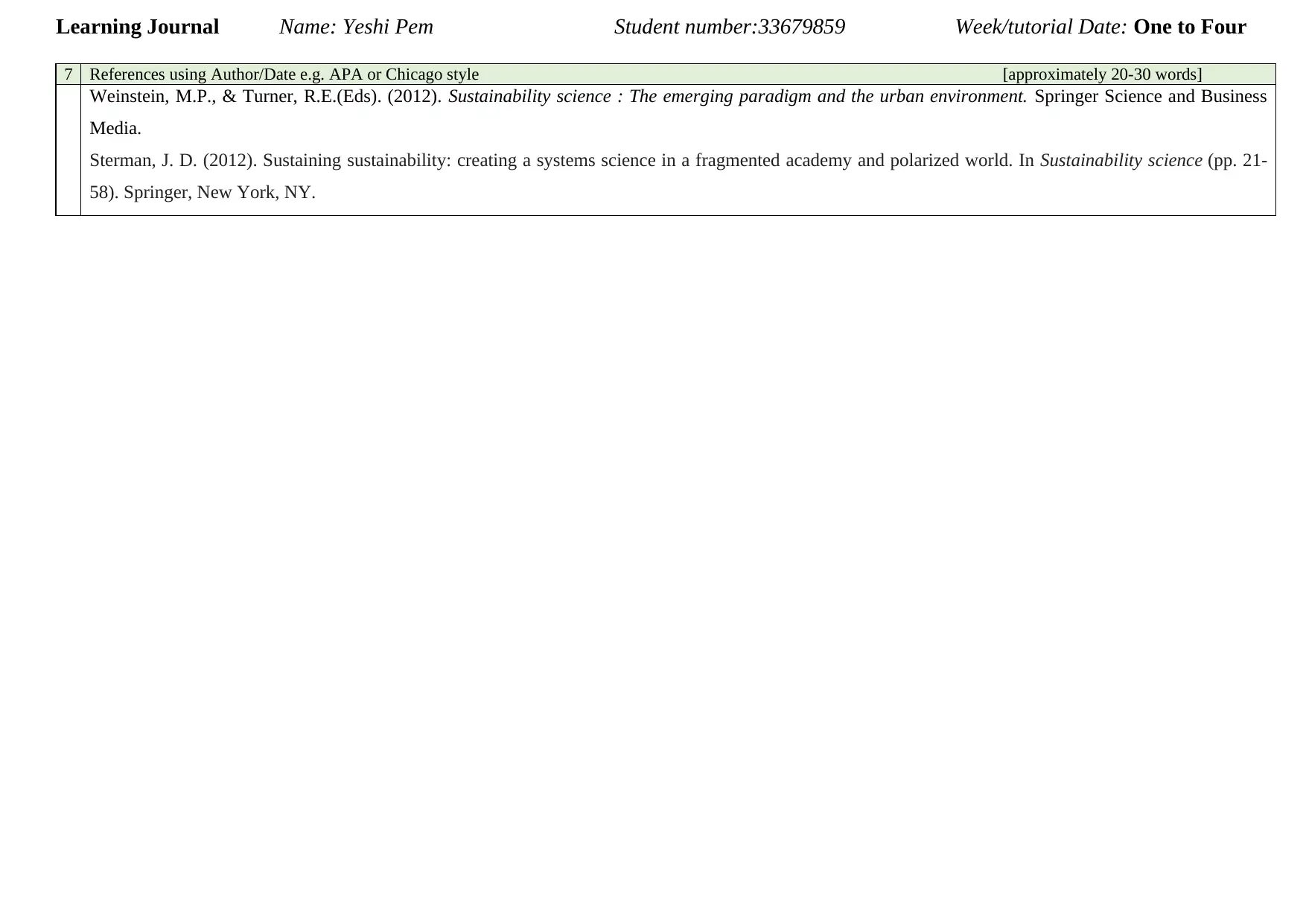
Learning Journal Name: Yeshi Pem Student number:33679859 Week/tutorial Date: One to Four
7 References using Author/Date e.g. APA or Chicago style [approximately 20-30 words]
Weinstein, M.P., & Turner, R.E.(Eds). (2012). Sustainability science : The emerging paradigm and the urban environment. Springer Science and Business
Media.
Sterman, J. D. (2012). Sustaining sustainability: creating a systems science in a fragmented academy and polarized world. In Sustainability science (pp. 21-
58). Springer, New York, NY.
7 References using Author/Date e.g. APA or Chicago style [approximately 20-30 words]
Weinstein, M.P., & Turner, R.E.(Eds). (2012). Sustainability science : The emerging paradigm and the urban environment. Springer Science and Business
Media.
Sterman, J. D. (2012). Sustaining sustainability: creating a systems science in a fragmented academy and polarized world. In Sustainability science (pp. 21-
58). Springer, New York, NY.
1 out of 8
Related Documents
Your All-in-One AI-Powered Toolkit for Academic Success.
+13062052269
info@desklib.com
Available 24*7 on WhatsApp / Email
![[object Object]](/_next/static/media/star-bottom.7253800d.svg)
Unlock your academic potential
Copyright © 2020–2026 A2Z Services. All Rights Reserved. Developed and managed by ZUCOL.




